Biking High Atlas To Sahara
Trip Overview
This 10-day Morocco adventure and bike tour features mountain and desert biking through the deep south, a land of big skies and stark mountain ranges. Adobe kasbahs are scattered throughout the desert amongst palm-fringed oases framed by snowcapped mountains. We ride along a network of dirt paths that wind from Marrakech to the highest pass in the Atlas Mountains, and then head southbound to the Sahara Desert. Biking along rocky, jeep tracks covering an average of 50 km / 31 mi per day. We pedal through traditional villages, visiting the ancient kasbah of Ait Benhaddou and stop for tea breaks to experience the legendary hospitality of the Berbers. As we descend from the High Atlas, the landscape changes and the Sahara desert starts to make its imprint. We head into the dunes in 4x4 jeeps, with the chance to ride camels before feasting on a desert barbecue and a night of slumber under starry Saharan skies. For mountain bike enthusiasts, this trip is your calling.
WOW FACTORS
- Spend a week mountain biking in the High Atlas Mountains, passing by traditional villages and ancient Kasbahs
- Ride a camel in the Sahara Desert before reaching a nomadic camp surrounded by dunes and little else
- Embrace Moroccan culture by enjoying a home-cooked meal, sipping mint tea at a Berber hut and visiting a hammam
Watch our Morocco biking highlight video here.
Itinerary & Map
Day 1
Marrakech
Arrival
A BikeHike Adventures representative will greet you at the airport and transfer you to a comfortable hotel in the centre of Marrakech. The remainder of the day is at leisure to wander through the beguiling labyrinth of tiny alleys and passageways in the ancient medina (old town).
Accommodation: Hotel
Meals: none
Day 2
Marrakech - Telouet
Mountain Biking
After our first Moroccan breakfast, we set off in Land Cruisers for a scenic drive to the kasbah of Telouet, The crumbling fortress is set in a remote valley overlooking mud villages and fertile gardens. We climb on switchbacks up the Tichka Pass, one of North Africa's highest paved roads. Over the pass we have a few more kilometres to drive before reaching the ruined kasbah. We’ll break for a picnic in the gardens, then hop on our bikes to begin our Morocco cycling tour. The ride begins at 1,800 m / 6,000 ft , so the first section might feel a bit tough. After about 10 km / 6 mi we start off-roading down a 32 km / 20 mi jeep track to Tamdaght, set in a desert palm oasis near Ait Benhaddou. The surface is occasionally very poor and sometimes rocky but there are some fun fast sections too as we descend through numerous mud villages and canyonland scenery to an altitude of 1,200 m / 4,000 ft. We aim to arrive well before sundown for some great photo opportunities from the terrace of our converted kasbah hotel. Overnight in a converted kasbah.
Biking Distance: 42 km / 26 mi
Ascent: +207 m / 679 ft
Descent: -665 m / 2,181 ft
Accommodation: Hotel
Meals: Breakfast, Lunch, Dinner
Day 3
Ait Benhaddou
Mountain Biking
This morning we’ll pack our gear onto Land Cruisers, then have a post-breakfast tour of the Ksour of Ait Benhaddou. This complex of adobe kasbahs is a UNESCO World Heritage Site and is still inhabited by a handful of families. It’s surrounded by date palms and rugged mountains and is probably the best-preserved village in the south of Morocco. It made an appearance in the film The Gladiator. Afterwards we set off in our support vehicles to the start of our 3-day ride through the remote Jebel Sirwa region. With no hotels and few village lodgings available we spend the first night under canvass and the second night in a basic village house. In Agouim we mount our bikes and pedal along a well-maintained dirt path westbound into the heart of the Sirwa. The path we tackle is hilly with one significant climb up to our wilderness campsite. En route we pass through some very remote villages and start to get a flavour for the area, although be prepared for constant changes in character and landscape throughout the three days we spend here! After a lunch break we climb onto an expansive plateau and set up our campsite. With luck, we'll have clear skies and panoramic views of the craggy mountains peaks of the High Atlas and the dark tabletop peaks of the Sirwa range. We're now at about 2,100 m / 6,889 ft above sea level so temperatures can drop below freezing so wrap up warm for a cold night of wilderness camping. Overnight in tents.
Biking Distance: 41 km / 25 mi
Ascent: +1,202 m / 3,944 ft
Descent: -586 m / 1,922 ft
Accommodation: Tent
Meals: Breakfast, Lunch, Dinner
Day 4
Askaoun
Mountain Biking
This morning we're back on our bikes, continuing along yesterday's path. Riding on the plateau is invigorating and we frequently pass nomads herding their flocks of sheep, goats and horses. Crossing the first village we descend along a dry riverbed, which is the "main drag" of the settlement. The buildings are all traditional. Women dress in bright costumes and the children are absolutely fascinated by us. We'll stop for a mint tea in a Berber hut and experience some of the local hospitality. Moving on, we climb onto another plateau along a rough track, an area strewn with volcanic boulders and stone houses which are inhabited by nomads. The scenery is wonderful and it's here that we reach the highest point of the day, meaning there's some great downhill to follow! As we cross the final pass, the landscape changes and it's obvious we've crossed the continental divide. The remainder of the day is mostly descending through a pleasantly rolling landscape with some fast riding possible along great trails. Arriving at the town of Askaoun we do one final descent to a house in a nearby village where we will enjoy a typical Moroccan home-cooked meal and spend the night in very basic conditions. Dinner and overnight at village house.
Biking Distance: 50 km / 31 mi
Ascent: +939 m / 3,080 ft
Descent: -1,245 m / 4,085 ft
Accommodation: Hotel
Meals: Breakfast, Lunch, Dinner
Day 5
Ouarzazate
Mountain Biking
Those who still feel energetic can make an early start from the village up a gradual 24 km / 15 mi climb. The scenery is wild and volcanic with some rocky passages as well as some smoother undulating tracks. Those craving a rest can take a transfer in our support vehicle up to the top of the pass - the top of one of Morocco's best descents down towards the plains of Ouarzazate. From the top of the pass there's about 35 km / 21 mi of jeep track to our finishing point - that's over 30 km of descent and just one glute-burning 3 km / 2 mi climb after lunch around the village of Tamachocht, an authentic village perched above a fertile valley of cultivated terraces. After our picnic lunch, a quick climb and some more downhill, we transfer out of the Sirwa back to civilization and the town of Ouarzazate. It's an hour's drive across strikingly desolate landscapes to our comfortable hotel overlooking the town's palm groves. Here you can enjoy a hammam, which is a typical Moroccan steam bath, and massage (women only) to relax any tired muscles. Overnight in a converted kasbah hotel.
Biking Distance: 60 km / 36 mi (24km / 15 mi of the biking distance is an optional ascent)
Ascent: +736 m / 2,415 ft
Descent: -1,469 m / 4,820 ft
Accommodation: Hotel
Meals: Breakfast, Lunch, Dinner
Day 6
Ouarzazate - Agdz
Mountain Biking
After a leisurely start to the day we have a short transfer towards Zagora, for the start of today's ride. There's an easy start with a thrilling 8 km / 5 mi descent on a dirt path which joins the valley of the River Draa, Morocco's longest river. Today's ride is nice and varied and not too taxing with several short climbs and descents as we follow the upper reaches of the river valley. Some of the villages along the way are startling, with abandoned kasbahs. Our overnight stop is around the town of Agdz where, depending on the size of the group, we will either stay in a beautifully-renovated kasbah just south of Agdz, or a French-run auberge in the palmery.
Biking Distance: 26 km / 16 mi
Ascent: +352 m / 1,155 ft
Descent: -609 m / 1,998 ft
Accommodation: Hotel
Meals: Breakfast, Lunch, Dinner
Day 7
Zagora
Mountain Biking
Riding out from our hotel we continue to explore the Draa Valley as we descend towards the fringes of the Sahara desert. The Draa Valley is one giant oasis of date palms, fruit trees and vegetables. En route we explore the passageways and ruined interiors of the extensive Kasbah Tamnougalte which overlooks the mountain of Jebel Kissane, a backdrop that stays in our view for some time. How far we ride today depends on the group. It's a day of rolling riding through typical villages with a picnic in the palm groves en route to Zagora, our destination. The full route is long so the last part of the journey will be in 4x4s. Zagora is a regional administrative centre which only dates back to French colonial times. From here it's 52 days by camel to Timbouctou. Overnight at auberge. (Distance variable depending on group preferences)
Biking Distance: 60 km / 37 mi
Ascent: + 506 m / 1,660 ft
Descent: - 614 m / 2,015 ft
Accommodation: Hotel
Meals: Breakfast, Lunch, Dinner
Day 8
Sahara Desert
Hiking
Today is our desert day (and night). After passing through an ever-changing landscape from High Atlas to desert, today we get our first glimpses of dunes. We have around 70 km / 43 mi of paved road and 60 km / 37 mi of path to cover as we head south-west. It's a harsh environment for biking so we transfer by vehicle as we make our way via Tagnite to Chegaga. It's a landscape of dunes and dry lakes, lost oases and lonely acacia trees; an area frequented by Saharan nomads with their caravans of camels. This is the deep south of Morocco and marks the start of the Sahara desert which stretches for a further 1,800 km / 1,118 mi or so southwards. En route we may get the chance to ride camels. There is no more powerful symbol of the desert than this extraordinarily adapted animal. In the afternoon we arrive at the trip's most southerly point, our desert camp surrounded by dunes and little else. Here our hosts set up camp for us and we spend the night in nomad tents with the "Great Bear" lighting up the desert skies, and enjoy a barbecue meal and a campfire. All day there are opportunities to walk. Overnight in typical nomad tents.
Accommodation: Tent
Meals: Breakfast, Lunch, Dinner
Day 9
Sahara Desert - Marrakech
Transfer
Today we have a serious transfer back to Marrakech, as we’ve travelled a vast distance across Morocco. The drive takes about seven hours, but Marrakech is a real highlight. Once we’re settled into our hotel, there is time to wander through the labyrinth of narrow alleys in the ancient medina, a UNESCO Heritage Site. You might like to visit the Badi and Bahia Palaces, the famous souks (markets), the Marrakech Museum, or the Majorelle Botanical Garden, owned by Yves Saint Laurent. Tonight we explore the main square, the Djemaa el Fna. At night the square is transformed into a giant open-air restaurant with men in white coats serving anything from sheep’s head stew to snails in hot sauce. The rest of the square is dedicated to other forms of entertainment such as snake charmers, storytellers, acrobats and dancers. Later on we head out for a farewell dinner and get a chance to experience what Marrakech offers in the way of nightlife. Overnight in a comfortable hotel.
Accommodation: Hotel
Meals: Breakfast, Lunch
Day 10
Marrakech
Departure
Depending on your flight time home, you can explore Marrakech at your leisure before transferring to the airport for your international flight back home.
Meals: Breakfast
NOTE about Ascent/Descent numbers:
The ascent/descent numbers are usually generated using Ride with GPS. The numbers are TOTAL ascent/descent for the day and these numbers do not suggest altitude. There are usually multiple small ascents and descents added up throughout the day to reach this total ascent/descent for the day. (While our numbers are generally consistent with Ride with GPS, depending on the mapping technology used, numbers may vary).
What's Included
TRIP INCLUSIONS:
All accommodation (twin shared), meals as indicated, internal transportation, all equipment (Giant Talon mountain bikes with front suspension and camping gear) and English-speaking guides.
TRIP DOES NOT INCLUDE:
Airport departure taxes, meals not indicated, gratuities, and items of a personal nature.
MEALS:
9 Breakfasts, 8 Lunches, 7 Dinners
ACCOMMODATION:
Hotel: 7 Nights
Tent: 2 Nights
Trip Facts
Weather in Morocco
Coastal areas tend to have a less extreme and more temperate climate than the interior, feeling pleasantly warm in winter and not ferociously hot in summer. Most Atlantic regions benefit from a sea breeze, which keeps summer temperatures down. Rainfall levels are significantly higher than in low lying areas in the interior.
The plains of the interior have more extreme of temperatures, ranging from a punishing hot in summer (particularly during July and August) to cold in winter. Precipitation levels are very low, and any rain that does fall is most likely in November, February and April.
The Atlas Mountains and their associated sub-ranges are subject to variable conditions with much higher levels of precipitation (falling both as rain and snow in the high mountains) and colder conditions. There are significant regional variations, but generally the north side of the mountains is more bearably hot in summer, and colder in winter than the south side. Night-time winter temperatures can fall as low as -10ºC / 14ºF and daytime summer temperatures can climb into the upper 30s ºC / upper 90sºF.
The south of Morocco is notoriously hot in the summer, particularly on the fringes of the Sahara. Although winter daytime temperatures are very pleasant, they tail off dramatically in the evening and often drop well below freezing. The north of Morocco is very lush by comparison as a result of much higher rainfall and temperate conditions.
Travel Documents
Citizens of Canada and the US require a valid passport to enter Morocco. Passports must be valid for six months beyond the date of entry or entry may be refused. There are no visas required for people travelling with Canadian or American passports. Citizens of other countries should check with the local embassy for updated information on entry requirements.
Food and Water
Moroccan food is a combination of European and Arab influences. Some typical Moroccan dishes include tagines (gently steamed stews) and pastillas (sweet and savoury flaky pies). Spices also take centre stage in Moroccan kitchens, with chilies, cinnamon, cumin, coriander, saffron, paprika, and ginger. Breakfasts usually consist of locally made crepes, toast, jam, fresh orange juice and tea/coffee. Alcohol is not widely available in Morocco, although larger hotels, foreign-owned auberges and upmarket restaurants sell it.
FAQ
Our adventures are built for small groups, with a maximum of 12 travellers on each guided tour. Each group is diverse, comprised of men and women of many different nationalities and ages. By travelling in small groups we leave minimal ecological impact, cause less disruption to the native life and are able to gain a better appreciation for our surroundings. Small numbers also allow greater flexibility and spontaneity: a dinner in a local home, an impromptu village wedding invite and any such experiences that can become among the most memorable experiences of your BikeHike adventure.
We understand that people come in many fitness levels, so we've graded our trips accordingly. There are four difficulty levels on our trips: Easy, Moderate, Challenging, and Strenuous.
This is a “challenging” trip.
The main challenge of the trip is the physical demands of consecutive days of riding, along with some climbing. We will be riding an average of 6 hours per day. You should have a good level of fitness and the stamina to cope with being in the saddle for consecutive days.
We strongly recommend that you begin a regular fitness program that includes regular cycling - that is if you are not already doing so. Working out four times a week (including some riding whenever possible), 60 minutes per session should be a minimum to prepare you for this adventure. In addition, try to get in some longer distance rides beforehand to prepare for your adventure. Doing some rides between 30-50 km (18-31 mi), with a good amount of climbing involved, would be optimal training for this tour.
BikeHike Adventures has been operating since 1994.
The logistics of organizing tours to remote corners of the world can be very complex. Our trip development department spends long hours researching destinations, routes, ground operations and equipment. All itineraries are screened without clients before they are added to our growing repertoire of adventures. Nothing is untested.
Our travellers share a common love for outdoor adventure. Most are looking for a physical adventure in an unfamiliar destination. A typical trip is comprised of men and women in good physical condition, who exercise regularly and are invigorated by a personal challenge. The age range on this trip is typically from 35-60, although we occasionally get younger and older travellers as well.
Marrakech. You can arrive anytime on day 1 of the trip and depart anytime on day 10.
The best time of year is from April/May and September/October – it is less hot compared to summer and not as cold as the winter months. Morocco is generally a dry country, but the High Atlas Mountains are subject to variable weather conditions, so wet and windy weather is possible. Temperatures also vary from north to south and with altitude but during our trips we normally experience warm days with the possibility of some hot days (particularly in the south). Also come prepared for cold nights especially the nights camping, where temperatures can drop to freezing.
Can I take this trip if...
This trip is quite popular with singles. Unlike many adventure travel companies, we don't charge single supplement fees to solo travellers. Instead, we pair you with another traveller of the same gender. If we can't find you a roommate, you get your own room at no additional charge. A single private room supplement fee is only required if you specifically request a confirmed private room for the duration of the trip. Learn more about solo travel with BikeHike.
We will do our best to accommodate special dietary requests (e.g. vegetarian, gluten free, etc.), but ask that you please discuss your request with us when signing up for a trip.
This trip is generally not a family focused trip for young children. However, this trip could be suitable for very strong and active older teenagers.
We do offer many other Family Focused trips, some of which are able to accommodate children as young as six.
More about this trip...
This trip is not suitable for E-bikes.
The bikes provided are Giant XTC mountain bikes with front suspension.
On this trip we ride an average of 50km/ 30 miles a day. The trip is not suitable for those with no biking experience. The riding is mainly on rocky, jeep tracks that can be rough and rocky, and there are a few tough climbs in access of 1500 ft. / 450 meters each. The terrain is mountainous as opposed too hilly. It’s not for the faint hearted and good physical fitness is required. Our route winds from Marrakech to the highest pass in the Atlas Mountains, then heads southbound to the Sahara Desert. We pedal through traditional villages, stopping for tea breaks to experience the legendary hospitality of the Berbers
This adventure is a challenging trip and the route traveled is through regions with varied temperatures, particularly at night.
In order to ensure comfort and health, good outdoor gear is essential. We have prepared a packing list that you can download by clicking the link to the right on this page.
Yes. We will have a support vehicle shadowing our route, carrying all of the nuts and bolts (fresh water and snacks) and all of the group luggage so that riders don’t have to worry about carrying any gear while biking.
There are also two nights of wilderness camping on this trip. The camping is in remote areas without flush toilets. A toilet tent will be set up for privacy. All gear such as tents and sleeping mats are provided, however, you will need to bring your own sleeping bag. There is also a mess tent for cooking and dining.
Accommodation
Most of our trips include comfortable mid-range accommodations. This includes accommodation that provides a clean and comfortable experience in characterful surroundings that reflect the destination. To build stronger connections with the communities and support the local economies, we avoid using large international chain brands on BikeHike trips.
This trip includes the following types of accommodation:
HOTELS
In an effort to keep money in the communities we visit around the world, BikeHike prefers small hotels, bungalows, and haciendas that showcase the character and local flair of each destination.
CAMPING
Camping on this trip involves camping in tents, in a pure rustic camping style. We will set up camp together for our first night camping in the mountains. In the Sahara, our hosts set up camp for us and we spend the night in nomad tents. That night we'll enjoy a barbecue meal and a campfire. This is an incredible experience as you'll be tenting in the Saharan desert surrounded by dunes and little else! There are no proper washroom facilities such as toilets and sinks when camping, rather a toilet tent will be set up and warm bowls of water will be brought to your tent in the morning to freshen up.
Click HERE for more information about accommodation styles.
Trip At A Glance
| Day | Destination | Activity | Distance | Ascent / Descent | Lodging | Meals |
|---|---|---|---|---|---|---|
| 1 |
Marrakech
|
Arrival
|
— | — / — |
Hotel
|
— |
| 2 |
Marrakech - Telouet
|
Mountain Biking
|
42 km
26 mi
|
+ 207 m (679 ft)
- 665 m (2,181 ft)
|
Hotel
|
b,
l,
d
|
| 3 |
Ait Benhaddou
|
Mountain Biking
|
41 km
25 mi
|
+ 1,202 m (3,944 ft)
- 586 m (1,922 ft)
|
Tent
|
b,
l,
d
|
| 4 |
Askaoun
|
Mountain Biking
|
50 km
31 mi
|
+ 939 m (3,080 ft)
- 1,245 m (4,085 ft)
|
Hotel
|
b,
l,
d
|
| 5 |
Ouarzazate
|
Mountain Biking
|
60 km
36 mi
|
+ 736 m (2,415 ft)
- 1,469 m (4,820 ft)
|
Hotel
|
b,
l,
d
|
| 6 |
Ouarzazate - Agdz
|
Mountain Biking
|
26 km
16 mi
|
+ 352 m (1,155 ft)
- 609 m (1,998 ft)
|
Hotel
|
b,
l,
d
|
| 7 |
Zagora
|
Mountain Biking
|
60 km
37 mi
|
+ 506 m (1,660 ft)
- 614 m (2,015 ft)
|
Hotel
|
b,
l,
d
|
| 8 |
Sahara Desert
|
Hiking
|
— | — / — |
Tent
|
b,
l,
d
|
| 9 |
Sahara Desert - Marrakech
|
Transfer
|
— | — / — |
Hotel
|
b,
l
|
| 10 |
Marrakech
|
Departure
|
— | — / — | — |
b
|
Reserve a Spot on This Adventure
Reserve NowTrip Reviews
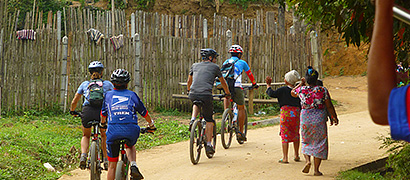
Have You Experienced This Trip?
Submit a ReviewThank you for setting up a great custom biking and cameling, sleeping in the Sahara for my daughter and me. We loved the experience and felt very safe with the local guide and driver for all of those days. And when they dropped us in Essaouira, they gave us some great tips that were so helpful for our next 5 days on our own!
I remember every moment to the day in Marakesh... it was so wonderful and the food at the little hotel was nothing short of the best I ever ate. All nite I listened to the calls to prayer. In and out of sleep. Many of my best moments in life were on your trips.. you can quote me on that! None more than the nite we spent in the Moroccan Sahara desert. That day and nite was epic beyond epic - I remember every moment of it.
Our guide and his crew were the best. They looked after us and introduced us to the Moroccan culture and the people in a very unique way. They were caring, informed, multilingual, professional - I could go on. Saaid, our main guide, was the best - and fun! This was a unique experience and we were not disappointed. I found the challenge had more to do with the weather and change of diet than the bike routes. The biking was amazing! It was an amazing trip.
Chose this tour for the fact that it was a challenging trip, but also for the high cultural aspect. The guide Saaid was INCREDIBLE. Friendly, patient, non-plussed, organized, willing to rework and rethink when needed, accommodating, did I say patient? I loved that Saaid gave us a "lesson" about Morocco and that he was willing to answer all my questions about culture.
The entire experience was so authentic - everything done just as if we were berbers in the desert. Playing in the sand dunes was just like being a kid again. It was absolutely crazy fun.




















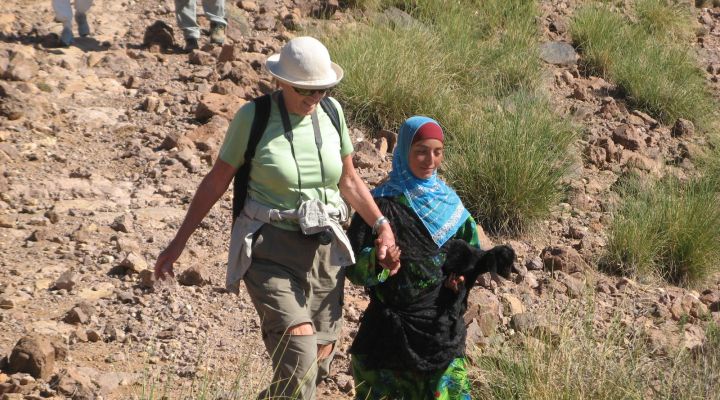
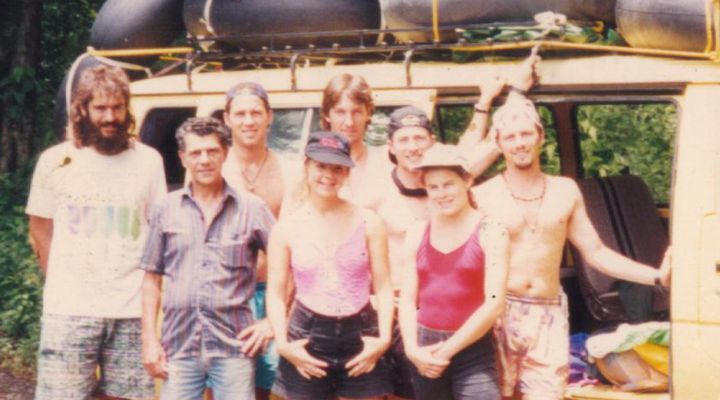
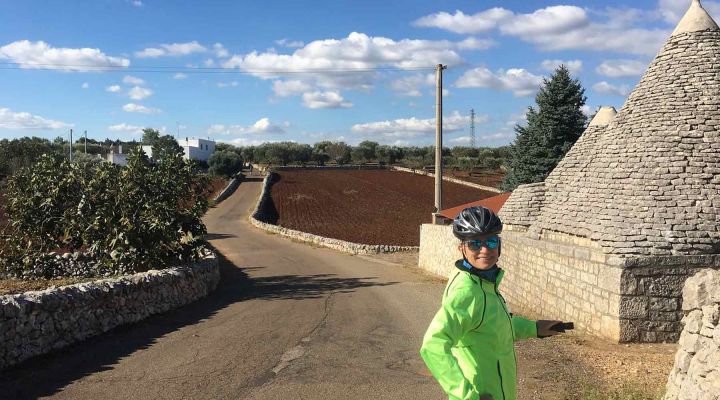
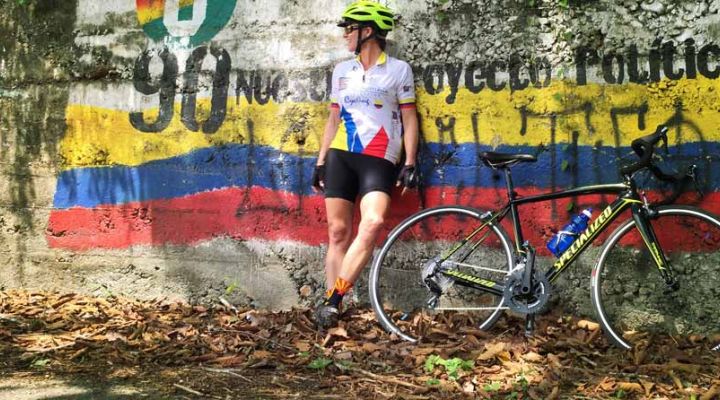
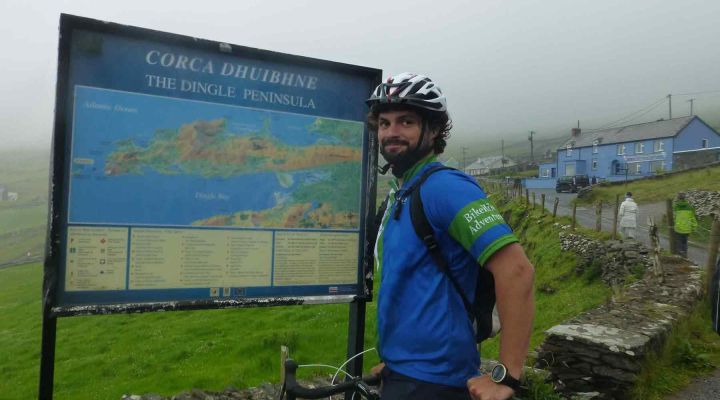
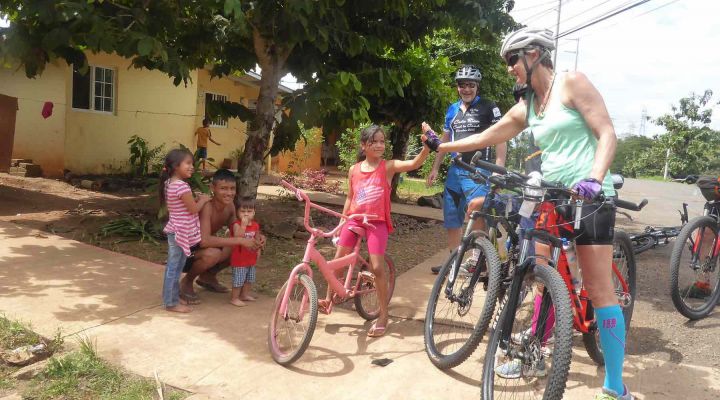
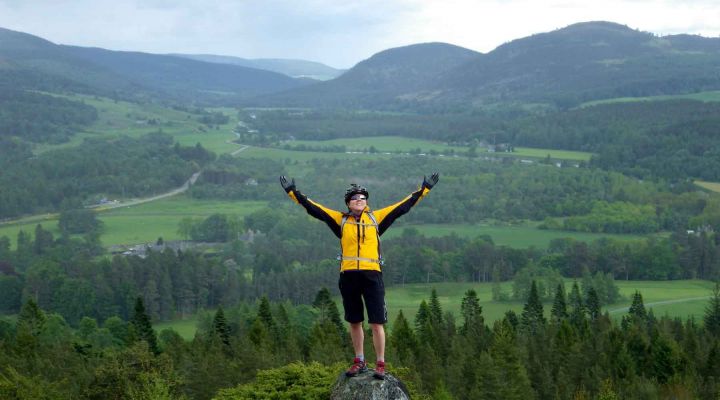
Submit a Review